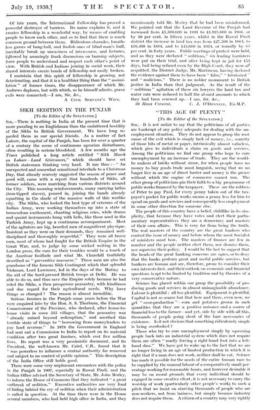SIKH SEDITION IN THE PUNJAB
[To the Editor of the SPECTATOR.] Sin,—There is nothing in India at the present time that is more puzzling to an Englishman than the embittered hostility of the Sikhs to British Government. We have long re- garded thent as our special friends. As a matter of fact Lahore, the capital of the Punjab, has been for over a quarter of a century the scene of continuous agrarian disturbance, often resulting in serious bloodshed. A few months ago the Times published a long article entitled "Sikh March on Lahore—Land Grievances," which should have set British statesmen thinking very hard. It ran thus :—" An unexpected and somewhat sensational interlude to a Christmas Day, that already scarcely suggested the season of peace and good will, came with a report that hundreds of Sikhs, all former soldiers, were marching from various districts around the City. This morning reinforcements, many carrying lathis (iron-tipped staves), poured in, joining the bands already squatting in the shade of the massive walls of this warlike city. The Sikhs, who looked the best type of veterans of the Indian Army, were working themselves up into a state of tremendous excitement, chanting religious cries, while drums and quaint instruments hung with bells, like those used in the Turkish Army, kept up a continuous accompaniment. Most of the agitators are big, bearded men of magnificent physique. Insistent as they were on their demands, they remained well- disciplined and thoroughly respectful." They were all brave men, most of whom had fought for the British Empire in the Great War, and, to judge by some wicked writing in the London press, the cure for their troubles would be a touch of the Amritsar fusillade and what Mr. Churchill truthfully described as " preventive massacre." These men are also the grandsons of the famous Sikh Contingent which that splendid Irishman, Lord Lawrence, led in the days of the Mutiny to the aid of the hard-pressed British troops at Delhi. He was able to do so, and thus save the Empire solely because he had ruled the Sikhs, a then prosperoits peasantry, with kindliness and due regard for their agricultural needs. Why have things so changed ? The reason is almost incredible.
Serious famines in the Punjab some years before the War were enquired into by the Hon. S. S. Thorburn, the Financial Commissioner of the Province, who declared, after house-to- house visits in some 535 villages, that the peasantry was already ruined beyond redemption," and ascribed this terrible state of things to " borrowing from moneylenders to pay land revenue." In 1878 the Government in England had sent out a Commission to India to report on its material condition after two great famines, which cost five million lives. Its report was a very pessimistic document, and its President, the well-known Mr. Caird, C.B., found that it " was powerless to influence a central authority far removed and subject to no control of public opinion." This description of the India Office still holds good.
There were some very unpleasant encounters with the police in the Punjab in 1907, especially in Rawal Pindi, and the Indian Office advised the Secretary of State, Mr. John Morley, to inform the House of Commons that they indicated a great outbreak of sedition." Executive authorities are very fond of hiding behind the cry of sedition when their administration is called in question. At the time there were in the Douse several members, who had held high office in India, and they
unanimously told Mr. Morley that he had been misinformed. We pointed out that the Land Revenue of the Punjab had increased from £1,500,000 in 1891 to £1,925,000 in 1908, or by 30 per cent. in fifteen years, whilst in the Rawal Pindi district the increase in land tax was from £27,500 in 1864, to 4:36,400 in 1884, and to £45,000 in 1904, or roundly by 03 per cent. in forty years. Public meetings of protest were held. and as they were declared " seditious," six leading barristers were put on their trial, and after being kept in jail for 153 days, hail being refused even by the High Court, they were all acquitted, the District Judge, Mr. Martineau, having declared the evidence against them to have been " false," " fabricated " and " malicious." There is no nobler monument to British justice in India than that judgment. As the result of the
seditious " agitation of these six lawyers the land tax and water rate were reduced to half the absurd amounts to which they had been screwed up.--I am, Sir, &e.,
50 Gans Crescent. C. J. O'DONNELL, Ex-ALP.
















































 Previous page
Previous page